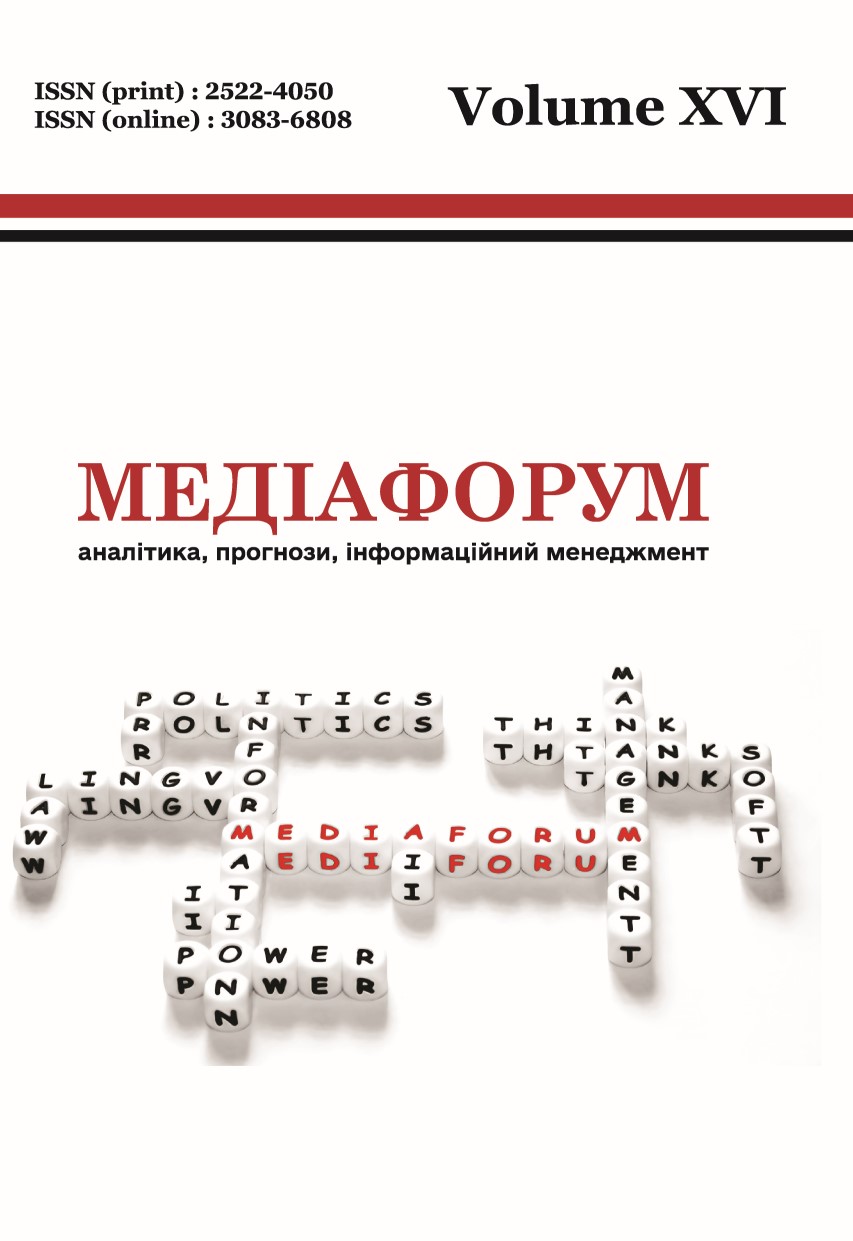The Phenomenon of International Climate Disinformation: Political Science and Psychological Perspective
DOI:
https://doi.org/10.31861/mediaforum.2025.16.139-160Keywords:
foreign interference and influence, international climate disinformation, emotional manipulations, cognitive biases, rhetorical strategies and logical fallaciesAbstract
The article positions climate change as a critically important area not only of national but also of international politics which becomes increasingly vulnerable to external interference. It examines climate change disinformation disseminated through the international interaction of countries. By analyzing the conceptual frameworks of foreign influence and interference, the authors explore approaches to the correlation of these terms, drawing a number of conclusions. In particular, in the context of climate disinformation, it is appropriate to distinguish between foreign interference and influence. Interference is viewed as a distortion of reality, the division of societies, and the weakening of democracy while influence is seen as a negative or positive phenomenon. The former perceives it as an information weapon against geopolitical adversaries while the latter sees it as the ability to transform external influence into a source of development, rather than threats. The presence of two terms in the academic discourse is claimed, i.e., international or foreign (external) climate disinformation, however, preference is given to the former – international climate disinformation. Characterizing the psychological mechanisms of the climate disinformation spread, attention is drawn to the fact that they generally operate in the same way, regardless of whether the disseminator is international or domestic. Emphasis is placed on the role of cognitive biases, emotional manipulations, rhetorical strategies and logical fallacies, direct attacks on scientists and scientific institutions, often accompanied by stereotypes of demonization or dehumanization. Counteracting the psychological impact of international climate disinformation requires special attention to the problem of cognitive (psychological) inoculation.
Downloads
References
1. Broda, E., & Strömbäck, J. (2024). Misinformation, Disinformation, and Fake News: Lessons from an Interdisciplinary, Systematic Literature Review. Annals of the International Communication Association, 48(2), 139-166. URL: https://www.tandonline.com/doi/full/10.1080/23808985.2024.2323736?scroll=top&needAccess=true#d1e126
2. Bullock, M., Stevens, M. J., Wedding, D., & Clinton, A. (Eds.). (2024). The Handbook of International Psychology. Taylor & Francis. URL: https://www.researchgate.net/profile/Fernando-Reyes-2/publication/390947451_The_Handbook_of_International_Psychology/links/68044665df0e3f544f42dd76/The-Handbook-of-International-Psychology.pdf#page=42.23.
3. Byman Daniel. (2025). Foreign Malign Influence Targeting US and Allied Corporations. URL: https://csis-website-prod.s3.amazonaws.com/s3fs-public/2025-03/250320_Byman_Foreign_Influence.pdf?VersionId=RRrbau8bPrR6dv7tHPjAMpFwaPY3d7Y3.
4. CAAD Briefing Note. (2024): Tenet Media & Climate Disinformation. (2024). URL: https://caad.info/wp-content/uploads/2024/09/CAAD-Briefing-Note_-Tenet-Media-Climate-Disinformation.pdf.
5. CAAD Data Monitor (2024): Alleged Russian Disinformation on US Soil Includes Divisive Climate Content. URL: https://caad.info/analysis/newsletters/caad-data-monitor-alleged-russian-disinformation-on-us-soil-includes-divisive-climate-content/
6. Countering Foreign Interference in Australia. (2024). URL: https://www.home affairs.gov.au/nat-security/files/cfi-australia.pdf.
7. Disinfo Update (2025). URL: https://www.disinfo.eu/disinfo-update-30-04-2025-2/
8. Edelson, S. M., Reyna, V. F., Singh, A., & Roue, J. E. (2024). The Psychology of Misinformation across the Lifespan. Annual Review of Developmental Psychology, 6. URL: https://www.annualreviews.org/content/journals/10.1146/annurev-devpsych-010923-093547.
9. EFPA Expert Reference Group (2024). Climate Change and Psychology. Glossary. URL: https://www.efpa.eu/efpa-expert-reference-group-climate-change-and-psychology-glossary
10. Foreign Interference a Threat to Democratic Security in Europe. (2025). URL: https://pace.coe.int/en/files/34253/html.
11. Fridman Ofer. (2024). Defining Foreign Influence and Interference. URL: https://www.inss.org.il/wp-content/uploads/2024/01/special-publication-040124.pdf
12. Fu Diana. (2025). Distinguish Foreign from Foreign Interference. Getting China Right at Home. URL: https://acf.sais.jhu.edu/distinguish-foreign-influence-foreign-interference.html.
13. Gedeon Joseph. (2025). Trump Administration Shutters US Office Countering Foreign Disinformation. URL: https://www.theguardian.com/us-news/2025/apr/16 /trump-state-department-foreign-disinformation.
14. Gerrits, A. W. (2018). Disinformation in International Relations: How Important is it? Security and Human Rights, 29 (1-4), 3-23. URL: https://brill.com/view/journals/shrs/29/1-4/article-p3_3.xml.
15. Kertzer, J. D., & Tingley, D. (2018). Political Psychology in International Relations: beyond the Paradigms. Annual Review of Political Science, 21(1), 319-339. URL: https://scholar.harvard.edu/files/dtingley/files/psyir.pdf
16. Kupiecki, R., Bryjka, F., Chłoń, T. (2025). International Disinformation. A Handbook for Analysis and Response. URL: https://www.researchgate.net/profile/Robert-Kupiecki/publication/388224411_International_Disinformation/links/6790035f82501639f5010116/International-Disinformation.pdf.
17. Lewandowsky S., Gilles E. (2012). The Pivotal Role of Perceived Scientific Consensus in Acceptance of Science Gignac and Samuel Vaughan. Climate Change, 3, 399-404. URL: https://skepticalscience.com/docs/Lewandowsky_2012_Consen sus.pdf
18. Liu, J. C. E., & Lee, C. F. (2025). Climate and Energy Misinformation in Taiwan. Frontiers in Communication, 9, 1531126. URL: https://www.frontiersin.org/journals/communication/articles/10.3389/fcomm.2024.1531126/full
19. McBride Megan et al. (2021). The Psychology of (Dis)information: Case Studies and Implications. URL: https://www.vaemergency.gov/aem/blue-book/reading-corner/the-psychology-of-dis-information-case-studies-and-implications.pdf.
20. McGuire, W.J. (1961). Resistance to Persuasion Conferred by Active and Passive Prior Refutation of Same and Alternative Counterarguments. Journal of Abnormal Psychology, 63, 326–332. URL: https://www.proquest.com/docview/614255786?pq-origsite=primo&sourcetype=Scholarly%20Journals
21. Munusamy S. et al. (2024). Psychological Factors Contributing to the Creation and Dissemination of Fake News among Social Media Users: a Systematic Review. BMC Psychology, 12(1), 673. URL: https://link.springer.com/article/10.1186/s403 59-024-02129-2#Sec6.
22. Nisbet, E. C., & Kamenchuk, O. (2019). The Psychology of State-sponsored Disinformation Campaigns and Implications for Public Diplomacy. The Hague Journal of Diplomacy, 14(1-2), 65-82. URL: https://brill.com/view/journals/hjd/14/1-2/article-p65_6.pdf.
23. Pamment, J., & Isaksson, E. (2024). Psychological Defence: Concepts and Principles for the 2020s. (No. 6). Myndigheten för psykologiskt försvar. URL: https://mpf.se/download/18.34845f44192b793f4ee27d9/1730120674895/241017_Psychological-Defence-Concepts-and-principles-for-the-2020s_rapport.pdf.
24. Pamment, J., Falkheimer, J., & Isaksson, E. (2023). Malign Foreign Interference and Information Influence on Video Game Platforms: Understanding the Adversarial Playbook. Myndigheten för psykologiskt försvar. URL: https://mpf.se/download/18.34f4c6361939015813e2ef/1733303782826/mpf-skriftserie-23-03-malign-foreign-interference-and-information-influence-on-video-game-platforms.pdf.
25. Psychological Defence Agency. (2024). URL: https://mpf.se/psychological-defence-agency/about-us/our-mission
26. Romero-Vicente Ana. (2023). Don’t Stop Me Now: the Growing Disinformation Threat against Climate Change. URL: https://www.disinfo.eu/publications/dont-stop-me-now-the-growing-disinformation-threat-against-climate-change /#_ftn2
27. Roozenbeek, J., & Van der Linden, S. (2024). The Psychology of Misinformation. Cambridge University Press. URL: https://books.google.com/books?hl=uk&lr=&id=dkj8EAAAQBAJ&oi=fnd&pg=PP1&ots=zp1wshLi7b&sig=jQ2-6lx3I5ewNWiok5TLptR4cBc.
28. Rowell, A., & van Zeben, J. (2016). A New Status Quo? The Psychological Impact of the Paris Agreement on Climate Change. European Journal of Risk Regul ation, 7(1), 49–53. URL: https://doi.org/10.1017/S1867299X00005377
29. Sealed indictment. (2024). URL: https://www.justice.gov/archives/opa /media/1366266/dl.
30. Sörensen, S., & Pamment, J. (2024). Operationalising the Framework for Evaluating Capability against Information Influence Operations: Case Study of the Psychological Defence Agency’s Courses. NATO Strategic Communication Centre of Excellence. URL: https://lup.lub.lu.se/record/962df74f-f79e-4f95-ba63-432258be71b6.
31. Spampatti, T. et al. (2024). Psychological Inoculation Strategies to Fight Climate Disinformation across 12 Countries. Nature Human Behaviour, 8(2), 380-398. URL: https://www.nature.com/articles/s41562-023-01736-0#Sec.
32. Steg, L. (2023). Psychology of Climate Change. Annual Review of Psychology, 74(1), 391-421. URL: https://www.annualreviews.org/content/journals/10.1146/annurev-psych-032720-042905














